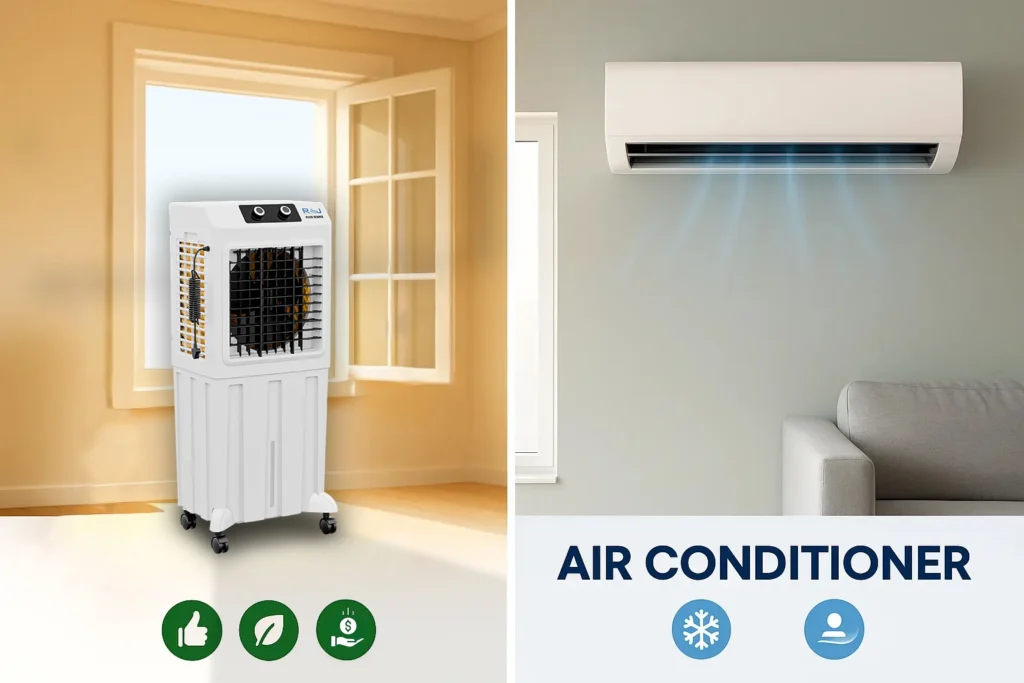When summer hits hard, the first thought on everyone’s mind is: How do I keep my home cool and comfortable with choosing the best product? The two most common solutions are air coolers and air conditioners. Both can make your space more livable, but they work very differently and have unique pros and cons. This guide breaks down everything you need to know how they work, where each performs best, costs, energy use, maintenance, and more so you can make the right choice for your home. We’ll also address common questions like whether coolers can work in closed rooms or if ACs can run on inverters or solar. By the end, you’ll have all the insights you need to make the right choice.
How Do They Work?
Air Coolers (Evaporative Coolers) work on a simple and natural principle of evaporation. Hot air is drawn into the unit and passed over water-saturated cooling pads. As the water evaporates, it absorbs heat and cools the air, which is then circulated into the room. Because this process adds moisture, air coolers are ideal for dry climates where humidity is low. They provide a steady flow of fresh air and can be used in semi-open spaces, patios, or well-ventilated rooms. However, in humid conditions, their performance drops because the air cannot absorb much more moisture.
Air Conditioners (ACs) use refrigeration technology. A compressor and refrigerant absorb heat from the room and release it outside, cooling and dehumidifying the indoor air in the process. They can bring down the room temperature significantly and work well even in humid or coastal areas. The downside is they require a closed environment, meaning doors and windows must be shut for efficient cooling, and they consume more power compared to coolers.
Cooling Performance and Climate Suitability
The climate where you live plays a huge role in choosing the right cooling device. Air coolers are excellent for hot and dry regions, like desert climates or areas with low humidity. They provide a refreshing breeze and even add moisture to the air, making it more comfortable. But if you live in a humid coastal city, a cooler can make the room feel sticky rather than cool. In such conditions, air conditioners outperform coolers, as they not only reduce temperature but also remove excess moisture, making the room comfortable.
Another difference lies in temperature control. Air coolers do not have thermostats; they lower the temperature by a few degrees and work best when directed toward the user. Air conditioners, however, allow precise temperature control and uniform cooling throughout the room, which is essential for very high heat or when several people share the same space.
Cost and Installation
Upfront costs can be a deciding factor for many buyers. Air coolers are significantly cheaper to purchase than ACs. They also don’t require professional installation, just add water, plug them in, and you’re ready to go. Many models are portable and can be moved from room to room, offering flexibility.
ACs, on the other hand, require a much higher initial investment. Besides the cost of the unit, there’s also the expense of installation, which may involve wall mounting, piping, and outdoor compressor placement. Window ACs are simpler but still need proper fitting. Once installed, ACs are stationary, so you cannot easily move them between rooms.
Energy Consumption and Running Costs
Running costs are where the difference becomes more obvious. Air coolers are far more energy-efficient. They run on low wattage, roughly equivalent to a ceiling fan and a small water pump, making them affordable to operate even for long hours.
Air conditioners are power-intensive. They consume several times more electricity than a cooler, which can significantly increase your monthly bill. Although inverter ACs and energy-efficient models have improved consumption, they still can’t match the low operating costs of a cooler. If you live in an area with high power tariffs or frequent usage, a cooler will save more money in the long run.
Can They Run on Inverters or Solar Power?
Air coolers are highly compatible with inverters and small solar systems due to their low energy demand. Even during a power outage, most home backup systems can easily run a cooler for several hours.
ACs are different. Running a 1-ton or 1.5-ton AC on an inverter or solar setup requires a high-capacity system, often with multiple batteries or large solar arrays. While possible, it’s costly and not common in most homes. For households with solar, ACs can be used during peak sunlight hours, but they remain power-hungry devices.
Air Quality and Health
Air coolers circulate fresh air and maintain humidity levels, which is helpful in dry climates and can prevent skin and throat dryness. They also require a window or door open for ventilation, reducing stuffiness indoors. However, stagnant water in a cooler tank can become a breeding ground for insects or bacteria if not cleaned regularly.
ACs filter indoor air and remove humidity, which helps in reducing mold and allergens in humid climates. But they recirculate the same air, which can feel stale if the room is closed for too long. Prolonged exposure to very dry AC air can cause dryness of skin and eyes.
For households with infants or elderly members, both devices can be safe when maintained properly, but coolers are considered gentler for people sensitive to overly dry air.
Maintenance and Lifespan
Air coolers are low-maintenance. They mainly need water refills and cleaning of pads and tanks to prevent odor or scale buildup. ACs require professional servicing, regular filter cleaning, and periodic checks of gas and electrical components. Repairs can also be expensive for ACs compared to coolers.
Environmental Impact
Air coolers are environmentally friendlier, as they consume less electricity and use water instead of chemical refrigerants. ACs rely on refrigerants, which, if leaked, can contribute to global warming, and their higher energy demand increases carbon footprint.
Conclusion
Both appliances have their place. If you need affordable, eco-friendly, and portable cooling, especially in a dry climate, a cooler is your best bet. If you require powerful, precise, all-weather cooling, particularly in humid conditions, an AC is the answer.
Would you be able to find a trusted cooler? Raj Cooling Systems offers a range of durable, high-performance air coolers designed for homes, commercial spaces, and outdoor events.

